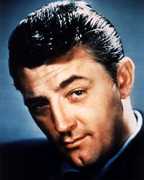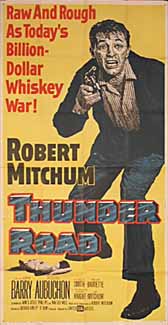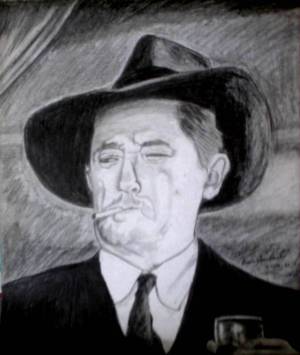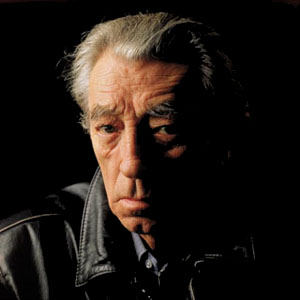Actor Profile:
ROBERT MITCHUM
(1917-1997)

"This is a ridiculous and humiliating profession," Robert Mitchum said of his career as an actor in 1952. "I make faces for the silver screen because I just don’t have anything better to do at the moment."
Assuming his statement was sincere, Mitchum didn’t have anything "better to do" for most of his 79 years. He entered the movies in 1943 as an extra in the Hopalong Cassidy western series that United Artists was grinding out at the time, and remained active right through 1995 when he appeared with Johnny Depp in a western of a different sort, Jim Jarmusch’s Dead Man.
In between, he became a star, was involved in one of Hollywood’s earliest drug scandals, pontificated amusingly to the press on his life as a movie star, was repeatedly panned for his alleged "sleepwalking" through roles, was hailed as a great actor, and never shook-off, or even tried to shake-off, his reputation as one of Hollywood’s biggest "bad boys." As he once said, "I haven’t changed anything but my underwear."
He was born August 6, 1917 in Bridgeport, Connecticut, the second child of a Scotch-Irish-Indian railroad worker and his Norwegian immigrant wife. His father died in a railroad accident less than two years after Robert was born, and the family, which included two sisters and a younger brother, was so impoverished, Mitchum said, that "My brother and I had to share one suit, so we could never go out together."
As a youth, he attended McKinley Grammar School in Bridgeport, and, thanks to his mother who was employed by a local newspaper, became a published poet. In 1933, with the Great Depression in full swing, he took to the road, hopping freight trains and living the life of a hobo. He settled down long enough in Delaware to meet Dorothy Spence, the woman he would marry, but continued his vagabond ways long enough to do a stint on a Georgia chain gang.
"I worked seven days repairing roads and then I just walked away. I guess I still owe them some time."
He boxed ("I was licked - thrashed"), worked in an auto factory, and when he rejoined his family which had relocated to California, joined his sister doing theater work. In addition to working as a stagehand, he played supporting roles and wrote and directed plays for children, including an effort titled Trumpet in the Dark that was honored by the Pittsburgh Festival of Arts as the best first play by an amateur. In 1939, an oratorio he wrote for Jewish refugees was among the presentations at a Hollywood Bowl event presided over by no less than Orson Welles.
Soon after, Mitchum was employed as tour manager for astrologer Carroll Righter whose speeches and syndicated newspaper column he often ghost wrote. In 1940, he married Dorothy and went to work at Lockheed. It was a grim time for the struggling performer. His displeasure with factory work was such that he couldn’t sleep and, after an episode of blindness, he quit on the advice of a physician. "(The doctor) said the reason I wasn’t sleeping was because I knew when I woke up I’d have to go to work. And I hated it."
Now determined to break into the movies, he got an agent who found work for him in the Hopalong Cassidy westerns then filming at UA. Playing bits and often unbilled, Mitchum appeared in seven of the films and soon found additional work at other studios. It was 1944’s When Strangers Marry, directed by future horror prince William Castle, that gave him a role in which he attracted the attention of critics and producers alike. This led to his being cast in MGM’s Thirty Seconds Over Tokyo starring Spencer Tracy. Mitchum’s supporting role impressed RKO where he was soon under contract.
In 1945, William Wellman cast him as the brave but doomed Lieutenant Bill Walker in The Story of G.I. Joe, a film that, in its day, was as effective a portrayal of the horrors of war as Saving Private Ryan would be more than half a century later. By the time he was Oscar nominated as best supporting actor, Mitchum had donned army fatigues for real. After eight months of service, he was given a discharge due to his being the sole support of his family.
Now a star, Mitchum was quickly branded a rebel for his refusal to take himself or his profession seriously. "This whole place," he said of Hollywood, "has no relation to real people. Oh, there are real people here, but they’re in the oil refineries and the factories, not in movieland. Not here. This is Atlantis."
 At the same time, many critics refused to take him
seriously.
At the same time, many critics refused to take him
seriously.
"...he just looks sleepy."
"...a completely monotonous and inexpressive performance."
"...gives no more animation than a Frigidaire to defrost."
"...performs somnambulistically."
"...as dispassionate as a hippo."
"...plays the lead role in a sort of stunned lethargy."
These barbs were fairly typical of the way the actor was reviewed, but among his efforts were some films that would later be hailed as classics, though rarely of the towering kind.
In the estimation of Newsweek, the 1947 western Pursued was "a horse opera with a difference - and with most of the difference in its favor." Regarded as the first "psychological" western, it is also a unique example of a western that flirted with the genre that French critics would soon label "film noir."
For Roger Ebert, Mitchum "embodies the soul of film noir," and 1947’s Out of the Past with Mitchum as a world weary private eye caught between a femme fatale and her lover is often considered the ultimate example of the genre. "Mitchum gives a very strong account of himself," Variety reported of his work in the film.
A year after the release of Out of the Past, Mitchum was involved in the most notorious scene of his long career, but this one wasn’t in a movie. On August 31, 1948 he was arrested with three others for possession of marijuana. When police asked what he did for a living, Mitchum, convinced that his career was ruined, said "Former actor."
Photographs of the star mopping the floor of his jail cell still turn up in books about Hollywood scandals, but insisting all the time that he had been "framed," Mitchum’s name was cleared in 1951 when the case was reviewed and he was judged not guilty.
Innocent or not, the famed bust would only enhance Mitchum’s already established reputation as a committed non-conformist, and his career would continue to thrive, thanks in no small part to support from Howard Hughes who assumed control over RKO at this time.
As for his reputation, Mitchum remained as publicly indifferent to what was whispered about him as he seemed to be about his career. "There are all kinds of rumors about me," he said, "and they’re all true, every one of them. You can make up some if you want."
Bad boy though he was, more diverse roles were coming his way. In the film of John Steinbeck’s The Red Pony, he was a farmhand trying to help a young boy whose father objects to his pleas for a pony. In Holiday Affair, he was a department store clerk romancing widow Janet Leigh in a lightweight but enjoyable Christmas themed movie. He was also being cast opposite some of tinseltown’s most glamorous leading ladies. In Macao, it was Jane Russell; in Second Chance, he appeared with Linda Darnell; the lovely Jean Simmons appeared with him in Angel Face; and in My Forbidden Past, his co-star was Ava Gardner.
Mitchum was free of his RKO contract and was freelancing when he shared the screen with the ultimate sex goddess, Marilyn Monroe, in 1954’s River of No Return. Filmed in Cinerama, the cliched western was Mitchum’s biggest box-office hit until the next year’s Not as a Stranger. Based on a popular best-seller by Morton Thompson, fans of the book were outraged at Mitchum’s casting as the ambitious but unethical doctor, and in the view of most critics, their anger was justified. "A monotonous performance," William K. Zinsser of The New York Herald-Tribune wrote, but the film was the fifth biggest box-office hit of the year.
Also released in 1955 was The Night of the Hunter. Written by James Agee, it was the only film directed by actor Charles Laughton, and though it came and went with little fanfare, it is now almost unanimously regarded as Mitchum’s greatest performance and his best film.
As the preacher with "LOVE" and "HATE" tattooed on the fingers of his hands, he epitomized evil and won his most spectacular notices to date. "Robert Mitchum plays the murderous minister with an icy unctuousness that gives you the chills," Bosley Crowther wrote in The New York Times. In later years, the film and Mitchum’s performance would only gain in stature. In 1979, Ken Wlaschin, writing in The Illustrated Encyclopedia of the World’s Greatest Movie Stars and Their Films, described it as "one of the cinema’s major works" featuring "not only Mitchum’s greatest performance but one of the cinema’s greatest performances."
Even if he could play evil incarnate to perfection, he could still be gentle and sympathetic as John Huston’s Heaven Knows, Mr. Allison proved. As a U.S. Marine stranded with a nun (Deborah Kerr) on an island surrounded by hostile Japanese soldiers, Mitchum showed a tenderness that surprised his critics, although some of them could still be snide even in their praise. "Even though as usual he does nothing but slob around the screen," Time said, "he has succeeded for once in carrying off his slobbing with significance."
 For someone who insisted he was an actor only "for the
money," he seemed uncharacteristically ambitious with
1958’s Thunder Road. Mitchum produced, wrote the story
for, starred, and even penned and performed the title
song which was a modest hit for the actor who had, by
this time, also branched out into a recording career.
Mitchum had wanted
Elvis Presley to star, but the rock
and roller’s price would have constituted half the
film’s budget. The low-cost moonshine epic was filled
from frame to frame with car chases, and it may very
well be the movie for which the label "cult film" was
created.
For someone who insisted he was an actor only "for the
money," he seemed uncharacteristically ambitious with
1958’s Thunder Road. Mitchum produced, wrote the story
for, starred, and even penned and performed the title
song which was a modest hit for the actor who had, by
this time, also branched out into a recording career.
Mitchum had wanted
Elvis Presley to star, but the rock
and roller’s price would have constituted half the
film’s budget. The low-cost moonshine epic was filled
from frame to frame with car chases, and it may very
well be the movie for which the label "cult film" was
created.
Somewhat more prestigious was The Grass Is Greener which reunited him with Deborah Kerr and Jean Simmons, and also starred Cary Grant with whom he apparently did not hit it off. Much better were his two other 1960 releases: The Sundowners, again with Kerr, featured Mitchum as a sheepherder whose wanderlust interferes with his family life, and Home from the Hill cast him as the patriarch of a dysfunctional family. For both films, he was named best actor of the year by the National Board of Review.
After starring in Jack Webb’s lightweight but amusing service comedy The Last Time I Saw Archie, Mitchum returned to psycho territory with a powerful performance in 1962’s Cape Fear. As vicious Max Cady, the ex-con who terrorizes Gregory Peck and family, he offered a portrait of pure evil that even Robert DeNiro couldn’t match in the 1991 remake. Other than a substantial role in the all-star cast of The Longest Day, the rest of the 60s were spent in routine movies that took their toll on his standing in the industry, but he returned triumphantly to the forefront of film actors as the drunken sheriff to John Wayne’s gunfighter in Howard Hawks’ 1967 El Dorado. Though no match for the earlier Rio Bravo for which it qualifies as an unofficial remake, it remains a hugely entertaining way to spend two hours.
Though Mitchum appeared in a total of six films during 1968-69, their combined production schedules were probably shorter than the year he spent on location in Ireland for David Lean’s Ryan’s Daughter, a modest story that the director pumped into an overblown epic with mixed results. Cast against type as a shy and impotent school teacher married to a younger woman, Mitchum earned raves from most critics and there was even talk of an Oscar nomination. Instead it was John Mills’ supporting performance that was honored at the awards ceremonies for 1970. Despite its mixed reception, the prestigious production was 1971’s fourth highest grossing film and, combined with Mitchum’s frequent appearances on TV talk shows at this time, brought him into a new decade with his stardom intact.
Some of his finest work, however, came in films that few people saw. 1971’s Going Home with Mitchum as an ex-con whose son can’t forgive him for having killed his mother, was a fascinating, complex drama that nonetheless was panned by critics. Even better is 1973’s The Friends of Eddie Coyle. As a small time hood who turns informant, Mitchum was superb but the film, so authentic in its depiction of the dead-end life of its criminal protagonists that it was more depressing than exciting, failed to find an audience and was all but forgotten come Oscar time.
 But Farewell, My Lovely was a hit in 1975. Cast as
Raymond Chandler’s knight-errant private eye Philip
Marlowe (pictured at left), Mitchum made himself very comfortably at home
in a role he seemed born to play. With Charlotte
Rampling effectively cast as a Lauren Bacall styled
femme fatale, the film successfully recaptured the
milieu of 1940s Los Angeles and paid tribute to the
noir style with which the actor, like the author, had
become linked. Marlowe may be Mitchum’s last great
role, so it was no surprise that he would be asked to
repeat it in a 1978 remake of The Big Sleep. Though
Mitchum was fine, his efforts were sabotaged by
director Michael Winner who recast Chandler’s noble
and lower class P-I as a well-dressed, affluent
investigator sleuthing his way through modern day
London. Other than a fine cast, Richard Amsel’s poster
design for the film remains its only redeeming
feature.
But Farewell, My Lovely was a hit in 1975. Cast as
Raymond Chandler’s knight-errant private eye Philip
Marlowe (pictured at left), Mitchum made himself very comfortably at home
in a role he seemed born to play. With Charlotte
Rampling effectively cast as a Lauren Bacall styled
femme fatale, the film successfully recaptured the
milieu of 1940s Los Angeles and paid tribute to the
noir style with which the actor, like the author, had
become linked. Marlowe may be Mitchum’s last great
role, so it was no surprise that he would be asked to
repeat it in a 1978 remake of The Big Sleep. Though
Mitchum was fine, his efforts were sabotaged by
director Michael Winner who recast Chandler’s noble
and lower class P-I as a well-dressed, affluent
investigator sleuthing his way through modern day
London. Other than a fine cast, Richard Amsel’s poster
design for the film remains its only redeeming
feature.
While many of his contemporaries, such as Burt Lancaster, Kirk Douglas, and Richard Widmark had turned to television in the 70s when quality feature film roles became scarce, Mitchum continued to plug along in the movies, but films like The Amsterdam Kill, advertised as "The Meanest Mitchum Movie Yet," and Matilda were major duds, and, in 1983, he turned to the small screen in a big way as the star of the mammoth mini-series The Winds of War. Though he was severely panned for being twenty years too old for the part of Pug Henry, the $40 million, 18-hour event surpassed Roots as the most watched TV program in history, bringing the 66 year-old actor before a greater audience than he had known in his 99 movies combined. At an age when most stars would be playing second fiddle to younger performers, Mitchum found himself on the covers of Time, Newsweek, and TV Guide. Five years later, a sequel, the 30 hour War and Remembrance would air to good but less spectacular ratings.
His best TV role came in 1983’s A Killer in the Family. Reviving memories of the preacher in Night of the Hunter and Max Cady in Cape Fear, Mitchum was as at his cold-blooded best as a father sprung from prison by his sons because they believe his life is in danger, only to regret their decision as they discover he is unrepentantly evil.
After that, there were more movies, few of them well-received or even worth his time, more TV appearances, several life achievement honors, a stint hosting Saturday Night Live, and even a TV series, a sitcom no less, that one suspects he could have done only for the money. A Family for Joe, in which he played a homeless man who agrees to pose as a grandfather for some orphaned children was a ratings disaster for NBC, and the show never made it beyond nine episodes. As a warm, lovable grandfather figure, Mitchum, as Lynne Heffley wrote in The Los Angeles Times, "looks as if he’d wandered onto the wrong sound stage and decided to hang around for kicks."
A series in which he might have been well cast was The Equalizer which starred Edward Woodward, and when Woodward suffered a heart attack in 1985, Mitchum agreed to replace him in two episodes of the popular CBS series.
And there were also TV commercials. Mitchum once told Entertainment Tonight that he would rob a bank before he’d hawk a product on TV, but he replaced James Garner as spokesman for the beef industry ("It’s what’s for dinner!") and, in an apparent attempt to remind viewers of his roles in Out of the Past and Farewell, My Lovely, donned a trenchcoat for a series of garbage bag commercials that must rank as his most humiliating on-camera experience.
He was a little more than a month away from his 80th birthday when lung cancer claimed his life on July 1, 1997, and it was suitably ironic that his passing would be almost forgotten a day later when a more beloved cinema icon, James Stewart, also passed from this earthly realm for parts unknown. Despite his unmistakable presence and enduring appeal, the extent of Mitchum’s talent was often overlooked in life.
"He has great talent," Charles Laughton said, while William Wellman praised him as "one of the finest, most solid and real actors we have in the world." To John Huston, he was "an actor of the caliber of Olivier, Burton, and Brando."
 The fact that he was underappreciated may have been
the result of his own apparent lack of ambition. Among
the roles that he could have had by merely saying
"yes," were ones that brought great acclaim to Burt
Lancaster (From Here to Eternity, Atlantic City),
Oscars to George C. Scott (Patton) and Gene Hackman
(The French Connection), and superstardom to Clint
Eastwood (Dirty Harry). Most of the films he did make are genre movies-westerns, action adventures, and film
noirs-that don’t generally win awards or placement on
ten best lists at year’s end. Then there’s Mitchum’s
denigration of his own talents. "I have three
expressions," he said. "Looking right, looking left,
and looking straight ahead." Or perhaps it was simply
a matter of interest or a lack thereof. "He’ll give a
creative performance if he believes in what he’s
doing," director Robert Parrish said, adding that
otherwise Mitchum simply hits his marks, read his
lines, and goes home.
The fact that he was underappreciated may have been
the result of his own apparent lack of ambition. Among
the roles that he could have had by merely saying
"yes," were ones that brought great acclaim to Burt
Lancaster (From Here to Eternity, Atlantic City),
Oscars to George C. Scott (Patton) and Gene Hackman
(The French Connection), and superstardom to Clint
Eastwood (Dirty Harry). Most of the films he did make are genre movies-westerns, action adventures, and film
noirs-that don’t generally win awards or placement on
ten best lists at year’s end. Then there’s Mitchum’s
denigration of his own talents. "I have three
expressions," he said. "Looking right, looking left,
and looking straight ahead." Or perhaps it was simply
a matter of interest or a lack thereof. "He’ll give a
creative performance if he believes in what he’s
doing," director Robert Parrish said, adding that
otherwise Mitchum simply hits his marks, read his
lines, and goes home.
Certainly when he believed, as he did in Night of the Hunter and Cape Fear, he was sensational. But even when he didn’t, he was, as Roger Ebert said, "there, the kind of screen presence that draws your attention...he is able to make a bad movie interesting."
Granted, there are a lot of interesting bad movies for which Robert Mitchum cannot escape blame, but there are more than enough good ones to credit him for, too. He was one of the greats, and we can be grateful that he never did find anything "better to do," after all.
© Copyright 1999, Brian W. Fairbanks. All Rights Reserved.
On Movies and Criticism
FOREWORD from I Saw That Movie, Too
TELEVISON MOVIES AND MINI-SERIES:
Nightkill (1980), One Shoe Makes It Murder (1982), The Winds of War, A Killer in the Family (1983), The Hearst & Davies Affair, Reunion at Fairborough, Promises to Keep, North and South (1985), Thompson’s Last Run (1986), War and Remembrance (1988-89), The Brotherhood of the Rose, Jake Spanner-Private Eye (1989), A Family for Joe (series pilot; 1990).
TV SERIES:
A Family for Joe (1990), African Skies
(1991).
MISCELLANEOUS TV APPEARANCES:
Stage Show
(1955), The Ed Sullivan Show (1955), Texaco Star
Theater, Climax (1956), The Ed Sullivan Show, It Could
Be You (1957), The Frank Sinatra Show (1958), Here’s
Hollywood (1961), The Dick Powell Show, The Ed
Sullivan Show (1963), Hollywood and the Stars (1964),
What’s My Line, The Today Show, The Tonight Show,
Truth of Consequences, The Celebrity Game, NBC Sports
in Action (1965), Portrait of a Star (1967), The Dean
Martin Show (two 1968 appearances), The Distant
Drummer (narrator, 1968), The David Susskind Show, The
David Frost Show, The Tonight Show (1970), The Dick
Cavett Show, The Tonight Show (1972), Hollywood: You
Must Remember This, The Dick Cavett Show, The Today
Show, America on the Rocks (narrator) (1973), The Jim
Stafford Show, Dean’s Place (1975), The Golden Globe
Awards, The People’s Choice Awards (1976), Ken Murray
Shooting Stars (1977), The Tonight Show (1978), The
Tonight Show (1980), Tomorrow (1981), The Tonight
Show, The Today Show, Entertainment Tonight (1982),
The Today Show, The American Film Institute Salute to
John Huston, The Barbara Walters Specials,
Howard Hughes: the Inside Story, Entertainment
Tonight, Good Morning America (1983), Robert Mitchum
(interview,1984), Good Morning America, Entertainment
Tonight, Late Night with David Letterman (1985), The
Entrepreneurs (narrator), Marilyn Monroe: Beyond the
Legend, Chandler, Larry King Live (1986), The
Equalizer (two episodes), Saturday Night Live (1987),
Late Night with David Letterman, Remembering Marilyn,
Champlin on Film, Hollywood: the Golden Years, The
Tonight Show (1988), William Holden: Golden Boy, The
Golden Globe Awards, The People’s Choice Awards, John
Huston: The Man, the Movies, the Maverick, The Golden
Years, Scandal, The Eyes of War (narrator), (1989),
Crazy About the Movies: Robert Mitchum: the Reluctant
Star, Reflections on the Silver Screen, Waiting for
the Wind (1991), The Golden Globe Awards (recipient of
Cecil B. DeMille Award for lifetime achievement).
More Actor Profiles
More on Mitchum
